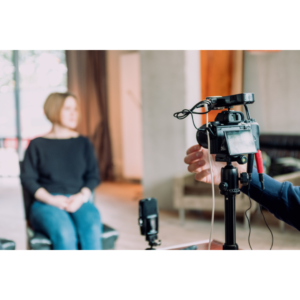The Role of Legal Videography in Depositions and Tests
Lawful videography has actually arised as a crucial tool in both depositions and trials, providing a multifaceted method to documenting witness testimonies. As lawful professionals increasingly identify its worth, it motivates a deeper exam of exactly how these visual documents can affect juror understandings and test outcomes.

Importance of Legal Videography
Legal videography plays a critical role in the paperwork and discussion of depositions and tests. This specific area integrates technical abilities with lawful knowledge to develop a trusted record of procedures that can dramatically affect case end results. The aesthetic aspect of legal videography boosts the understanding of witness statement, enabling jurors and courts to observe not only the spoken words however also the demeanor, feelings, and body movement of the witnesses.
In addition, legal videography provides an objective account of events, lessening the possibility for false impression that can accompany created records alone. This visual paperwork functions as an essential device throughout test presentations, helping with a clearer and more influential narrative for both complainants and offenders. The capacity to replay video clip sections throughout court process enables lawful teams to stress key factors, enhancing their disagreements efficiently.
The relevance of legal videography expands past the court; it additionally plays a vital function in preserving evidence for future recommendation, whether for appeals or additional lawsuit. As such, its assimilation into the legal process is essential for making certain a reasonable and precise representation of the facts, ultimately adding to the quest of justice.

Process of Legal Videography
While capturing the subtleties of depositions and tests, the process of legal videography involves a number of crucial steps that ensure top notch, precise recordings. A specialist legal videographer prepares by reviewing the situation products and understanding the details needs of the deposition or test. This preparation includes familiarizing themselves with the individuals and the context, which aids in recording relevant details.
On the day of the recording, the videographer establishes the necessary equipment, which typically includes high-def cams, microphones, and correct lighting. Making sure optimum angles and audio top quality is critical, as it straight influences the performance of the recording. The videographer connects with attorneys and participants to establish protocols, guaranteeing that everybody comprehends the recording process.
During the deposition or trial, the videographer carefully videotapes the process, paying close interest to both spoken and non-verbal cues. This consists of recording the temperament and reactions of witnesses and attorneys. After the session concludes, the videographer might edit the video for clearness and conformity with lawful requirements, creating an end product that precisely reflects the proceedings for future referral and usage in legal contexts.
Benefits in Depositions
The unification of videography in depositions uses numerous benefits that enhance the general procedure of gathering proof. One main benefit is the capability to capture witness statements with visual and acoustic fidelity, supplying a more precise depiction of the witness's behavior, tone, and body language. This multidimensional technique allows lawyers and juries to evaluate reputation better than typical written transcripts alone.
Furthermore, videographed depositions act as a powerful tool for maintaining testimony. Must a witness come to be unavailable for trial, their recorded deposition can be played in court, guaranteeing that their evidence remains accessible and pertinent. This facet substantially try this reduces the threat of shedding critical info that might impact case results.

Lastly, videography improves the overall professionalism of the deposition process, instilling self-confidence in clients concerning the thoroughness of their lawful representation (legal videography). By leveraging modern technology, lawyers can substantially improve the performance of depositions
Influence On Tests
In lots of trials, the assimilation of videography can considerably affect the presentation of proof and the court's perception. Lawful videography captures witness testaments and critical evidence in a dynamic style, enabling jurors to involve with the product on multiple degrees. This visual component enhances the storytelling element of a trial, supplying context and emotional vibration that traditional text-based proof might do not have.
Moreover, video recordings can act as effective tools for impeachment throughout cross-examination. When inconsistencies emerge between a witness's prior statements and their court room testament, video clip evidence provides an unbiased reference that can sway jurors' point of look at this site views. This immediacy and quality can bolster the trustworthiness of a party's story while concurrently weakening opposing disagreements.

Future Trends in Legal Videography
As we look toward the future of lawful videography, several arising patterns assure to improve its function within the court room. One substantial fad is the assimilation of fabricated knowledge (AI) in video analysis and modifying. AI can enhance the process of identifying essential minutes in tape-recorded depositions, permitting lawyers to rapidly access appropriate web content, thus improving efficiency in case preparation.
Additionally, the increase of digital reality (VIRTUAL REALITY) and increased fact (AR) modern technologies is anticipated to change how jurors experience evidence. legal read what he said videography. By immersing jurors in a substitute environment, these innovations can give an extra extensive understanding of intricate scenarios, causing even more enlightened deliberations
Additionally, the increasing need for remote depositions, sped up by the COVID-19 pandemic, will likely proceed. Legal videographers will certainly need to adjust to new software and systems to guarantee top notch recordings in online settings.
Finally, the growing emphasis on information security will demand more stringent procedures for storing and sharing video clip proof. As the lawful landscape evolves, lawful videographers must remain abreast of these patterns to maintain their importance and efficiency in the judicial process.
Conclusion
In recap, legal videography serves a vital feature in the judicial procedure, improving the honesty of depositions and tests. As technology proceeds to advance, legal videography is positioned to more transform its role within the lawful landscape.